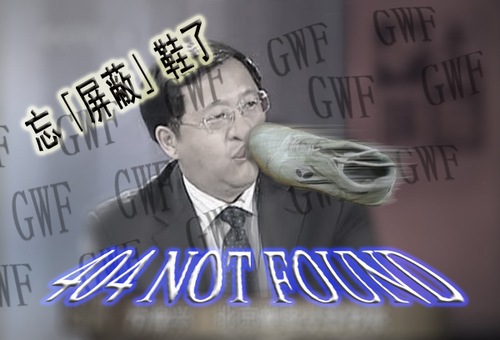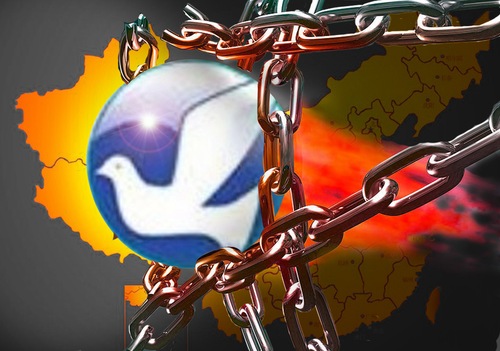Breaking through Internet Censorship for the People of China
(Minghui.org) On June 27, 2013, Fang Binxing, President of Beijing University of Posts and Telecommunications announced his resignation due to “health reasons” at a graduation ceremony. His resignation met with jubilation across China.
Chinese Internet users responded with: “Good is rewarded and evil is punished”, and a sarcastic couplet: “Thousands of People Point Fingers at You When You Are Alive; One Humiliating Name Will Follow You after You Pass Away.” The title of the couplet was “A Life Journey Not Taken in Vain.”
 Fang Binxing, target of public criticism
Fang Binxing, target of public criticism
In May 2011, students threw eggs and shoes at Fang during a speech at Wuhan University. Fang sent a New Year greetings message to Chinese Internet users earlier this year, but received 250,000 “Get Lost” return messages within two days.
Why is Fang Binxing the target of such public criticism? For years, China has been ranked by international organizations as a “common enemy of the Internet”. Fang (nicknamed “Father of the Great Firewall - GFW”) played a key role in the establishment of Internet censorship by the Chinese Communist Party (CCP). He was the CCP's cyber-warfare spearhead to eliminate truth and freedom of speech, and spared no effort to achieve the CCP's censorship goals.
History of the Great Firewall of China
The CCP has maintained its dictatorship by deception and violence. As the world entered the information age and with the advent of the Internet, the CCP spent a significant amount of public funds to develop the Great Firewall project.
The project launched in 1998, in an attempt to block information flow and free speech of the Chinese people. After the persecution of Falun Gong started in July 1999, the blockade prevented the exposure of facts about Falun Gong and censorship intensified to a previously unseen level.
On July 20, 1999, Jiang Zemin, then General Secretary of the CCP, utilized the entire state media apparatus launching the brutal persecution of tens of millions of Falun Gong practitioners in China with the policy: “Ruin their reputation, eliminate them physically and bankrupt them financially”.
The CCP controlled over 3,000 of China's newspapers and magazines along with several hundred TV and radio stations to defame Falun Gong (specifically choosing to label it a “cult” due to the worldwide negative connotation) and export their propaganda overseas. Global media were saturated with lies against Falun Gong for a period of time, while the CCP also tightened its blockade on truthful, factual information flow from the outside world.
In December 1999, the CCP State Council established a National Information Work Leadership Team led by Deputy Premier Wu Bangguo. Soon after, Fang was transferred from Harbin Institute of Technology to work in the core organization – the National Computer Network Emergency Response Technical Team Coordination Center of China. He became the center's chief engineer one year later, then director in 2002.
In May 2000, China started to implement its national information filtering/monitoring system, the centerpiece being the National Information Security Management System – commonly referred to as the Great FireWall or GFW.
The GFW monitors, analyzes and filters domestic and international information flow, targets websites and their information, tracks and intercepts unapproved Internet (IP) addresses and blocks oppositional messages on the Internet.
Who Participated
The GFW's functionality is determined by requirements and directives from the CCP Politburo, the Political and Judiciary Committee, Ministry of National Security and the 610 Office. The GFW is regarded as a “National Defense Project” under the direct leadership of the CCP Politburo; Jiang Zemin, Li Lanqing and Wu Bangguo paid close attention to this project.
Fang directed the development and management of the GFW. He was the chief engineer and coordinated the efforts of various research institutions and suppliers including: • information security lab at Harbin Institute of Technology, • Institute of Computing Technology/Institute of Software/Institute of High Energy Physics, Chinese Academy of Sciences, • Technology University of National Defense, • the 3rd Department of the General Staff Headquarters of the People's Liberation Army (PLA), • the 9th Bureau of Ministry of National Security, • Beijing University of Posts and Telecommunications, • Xidian University, • Shanghai Jiao Tong University, • Beijing Jiao Tong University, Beijing Electronics Science & Technology Institute, • PLA Institute of Electronic Technology, • Section 13 of Ministry of Industry and Information Technology of the People's Republic of China, • Section 56 of PLA General Staff Headquarters, • nearly all major universities in China.
The institutions participating in GFW development received equipment and technical support from major technology companies including: • Cisco Systems Inc, • Nortel Networks Corporation, and • Huawei Technologies Co. Ltd.
Cost
According to CCTV (China Central Television) reports, costs for the preliminary stage of the “Golden Shield” program had already risen to well over one billion dollars by the end of 2002.
In terms of human resources, outside estimates claim that the CCP employed more than 300,000 personnel in the development and operation of the largest and most rigorous network monitoring system in the world.
What is Blocked
According to a 2005 research report by Professor John Palfrey of Harvard University, the Chinese Communist regime blocked: • 10% of all (so called) “pornography” websites, • close to 50% of the information available on the Tiananmen Square protest of June 4, 1989, • 60% of online information related to opposition political parties, • 90% of information on the Nine Commentaries on the Communist Party • 100% of all information reporting positively on Falun Gong. Research by experts from the Department of Computer Science and Engineering at Michigan State University suggests that controversial filtering software known as the “Green Dam”, pre-installed on all computers sold in China since 2009, was set up to filter and block information about Falun Gong.
The GFW information filtering system targets numerous overseas search engines, free blog services, popular Chinese community forums, virtual storage management (VSM) systems, video/photo services, Chinese websites of radio stations, free servers or host units, proxy servers or websites that are able to break through the censorship, home pages of well-known portals, as well as technical, shopping, charity, religious and human rights websites.
The GFW has become the largest “wonder” of the virtual world by locking the largest number of netizens on the planet inside its wall, while blocking the fact-bearing websites outside. It performs like a disgraceful hacker - intercepting, interfering with and blocking Internet users' normal communications, and arbitrarily cutting off the Chinese people's contact with the free world, forcing them to live within a web of lies spun by the CCP regime.
Fang lost control of China's Internet Censorship program in April 2012 due to his involvement in the coup planned by Zhou Yongkang and Bo Xilai, and was under investigation by the CCP 's Central Commission for Discipline Inspection. Due to the fear of exposure of the large-scale, live organ harvesting of Falun Gong practitioners and the flood of members quitting the CCP, Fang's successors have spent more resources and manpower to further intensify the censorship of information flow and attacks on overseas websites.
Despite the Great Firewall, Ways to Circumvent it Proliferate
Bill Xia of the Global Internet Freedom Consortium said, “About one-third of China's total population are Internet users, so we feel a great sense of responsibility. We've got to break through the CCP Internet Firewall to bring the truth to the people. This is our mission.”
During the 14 year-long contest between censorship and its opposition, overseas anti-blockade technical experts established the “Global Internet Freedom Consortium”. They developed a dynamic network and anti-censorship tools such as Ultrasurf, Garden, Gpass and Firephoenix. These tools are now widely used in China, with hundreds of thousands of Chinese netizens breaking through the CCP censorship daily to browse overseas websites for factual information.
Many people are amazed that Falun Gong practitioners have gotten the upper hand in the cyberwar against CCP censorship, given the huge discrepancy in human resources and financial backing. Nevertheless, they have.
Many Internet users inside China have expressed their gratitude and respect to those free spirits whose unyielding courage and efforts have benefitted them. Examples of some quotes: • “Who represents justice, who represents evil? Let people make their own distinction in a free cyberworld.” • “Gold has value, yet truth is priceless. The Chinese people now have hope!” • “To the unknown heroes, all the Chinese people with a sense of justice and conscience cheer loudly for you!”
Senior researcher Michael Horowitz from the USA's Hudson Institute think tank stated that practitioners, regardless of their personal safety, and with incredible talent and wisdom, have defeated the CCP's Internet firewall that was built at the cost of billions. They have brought messages of freedom and peace to the world, benefiting all of us. Falun Gong practitioners will appear in the first chapter on this page of historical record.
